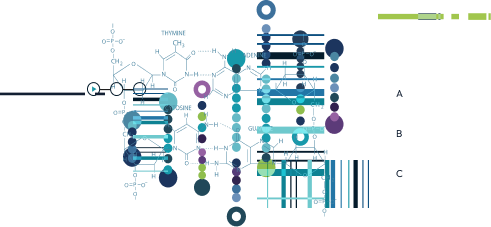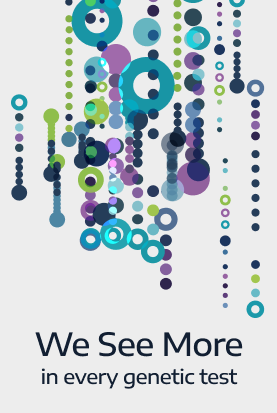Comprehensive Diagnostic Prenatal Testing with IriSight®

All genetic tests are not equal. When amniocentesis is recommended, our IriSight® portfolio of diagnostic, genome-based tests provide a complete picture of your baby’s DNA.
Genetic testing during pregnancy
Genetic testing looks for DNA changes that can affect your baby’s health or development. During pregnancy there are multiple types of genetic testing to consider. Oftentimes the testing journey begins with NIPT, also referred to as NIPS. These are acronyms for NonInvasive Prenatal Testing and NonInvasive Prenatal Screening respectively.
NIPT is a predictive test. It predicts whether your baby has a high or low risk of having a certain chromosomal condition. When a definitive answer or a more complete picture is desired, diagnostic testing based on amniocentesis* or chorionic villus sampling (CVS) may be considered. Diagnostic testing options include chromosomal microarray (CMA), exome and genome testing.
*Amniocentesis or CVS is sometimes recommended when ultrasound results are abnormal.
Genome testing reveals more in every test
When amniocentesis or CVS is recommended, it’s important to choose a test that provides the full picture. Different types of genetic testing look at different types of DNA changes. NIPT and CMA are able to detect large chromosomal changes, such as extra copies of chromosome 21 which cause Down syndrome. Most NIPTs limit their analysis to only a subset of chromosomes while CMAs analyze all chromosomes.
Exome and genome testing can additionally detect single base changes, such as changes in the CFTR gene that cause cystic fibrosis.


However, exome and genome testing are not equivalent.
Genome sequencing generates uniform coverage of >98% of your baby’s DNA. In comparison, exome sequencing removes and skews data, generating fragmented coverage of only 1-2% of your baby’s DNA.
By pairing genome sequencing with our Genomic Intelligence® proprietary analytical software, our IriSight® portfolio provides the most comprehensive testing possible – detecting additional DNA changes that are not possible to detect with exome testing.
The result is a more complete reading of your baby’s DNA.
Learn more about different test types and sequencing technologies.
Talk to your doctor or genetic counselor about whether genetic testing is right for you. And if so, which genetic test is the best fit.
Two IriSight® options for comprehensive diagnostic testing
Starting a conversation with your healthcare provider
Talking with your doctor or a genetic counselor is an important step in the process of making a decision about whether genetic testing is right for you. And if so, which genetic test is the best fit. The following questions may help get the conversation started:

- Based on my family history, personal history and this pregnancy, what types of prenatal genetic testing are available to me? Carrier screening? NIPT? CMA? Exome or genome?
- What types of genetic conditions will each test detect?
- What types of genetic conditions will each test NOT detect?
- What possible results can I expect from each test?
- How accurate is each test?
FAQs about IriSight® testing
We See More, So You Know More
If your healthcare provider suggests amniocentesis or CVS, ask about IriSight®. The most comprehensive genetic testing available.
Have questions?

